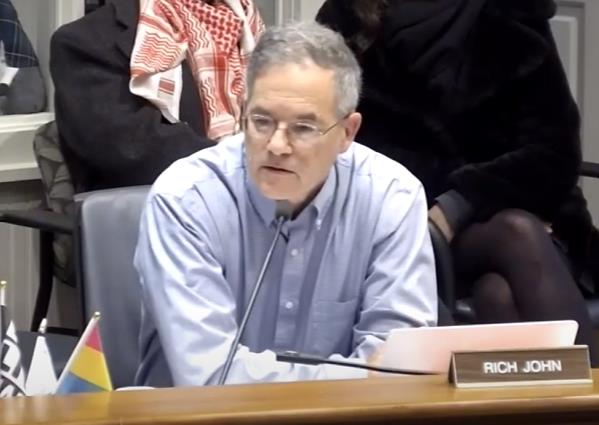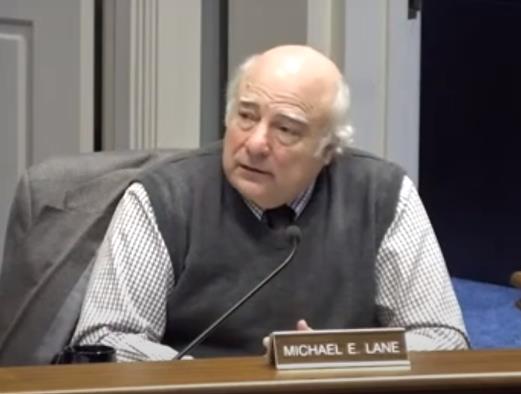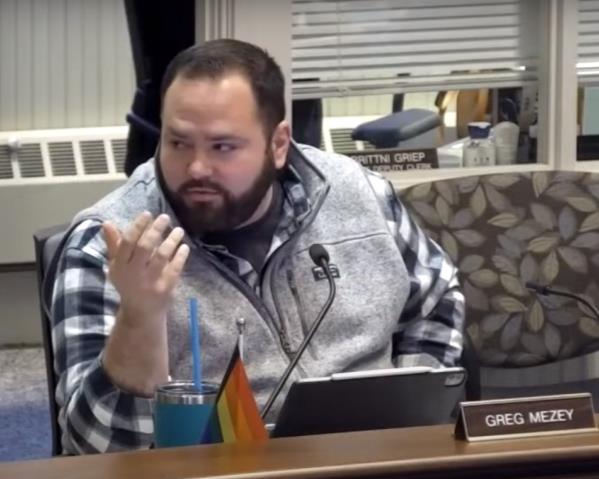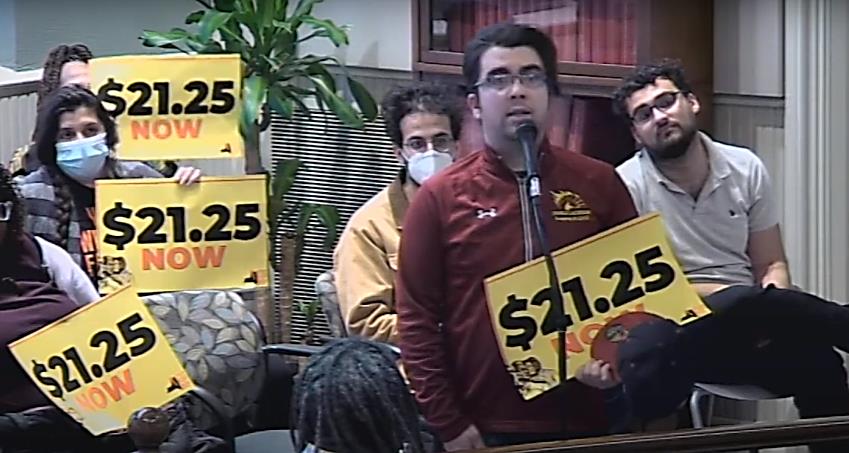County legislators give first thoughts to muzzling themselves. Don’t expect it.
Reporting and Analysis by Robert Lynch; February 2, 2024
[Update; February 6, 2024: By a razor-thin margin, and with one member absent, the Tompkins County Legislature Tuesday defeated the Resolution, advanced by four of its members, that would have supported a cease-fire in the Israel-Hamas war and urged a two-state solution to the Middle East conflict. The February 6th vote followed nearly two hours of public comments in favor of the Resolution, then nearly another hour of debate among legislators themselves.
Though seven legislators endorsed the measure’s passage Tuesday, and only six opposed it, the Legislature’s rules require eight votes to constitute a majority. Lansing’s Deborah Dawson, absent from the meeting, could have cast the deciding vote toward adoption. But Dawson has voiced prior criticism of Tompkins County’s taking a position on the Gaza war and would likely, if present, have joined the Resolutions opponents.]
****
It’s so hard for activist lawmakers to keep their mouths shut and their opinions to themselves, especially here.

Whether it concerns raising the minimum wage, imposing single-payer healthcare, outlawing the oil furnace, or saving the honeybee, the Democratic supermajority on the Tompkins County Legislature always has an opinion. And over recent years, they’ve spoken freely on those issues and to others by adopting Resolutions that may travel no farther than to the circular file of some legislative point-person’s office in Albany or Washington.
But what’s happened during the past month may have brought our local elected leaders to the breaking point… and their legislative practices to a turning point. It’s unlikely, yet possible.
During nearly a quarter-hour of unplanned discussion near the end of a routine committee meeting Thursday, five of the County Legislature’s 14 members wrestled about whether—and if so, how—to set some boundaries on expressing their own legislative preferences to decision-makers who reside far beyond the county line, or even, in one case, across the ocean.
“We do our homework, and we have access to information that we do tap into that we can make pretty informed decisions,” legislator Rich John asserted as he sparked Thursday’s debate among members of the Government Operations Committee. “Absolutely none of that is true for us in the Middle East,” John cautioned. “We are mere mortals. We have no expertise greater than anybody in the general public, and I don’t know that our opinions should carry any additional weight.”

Rich John got pushback from others that day. But his frustration arises from events at the two most recent meetings of the County Legislature. At each of those sessions, dozens of speakers, mostly left-leaning Palestinian sympathizers, have packed the visitors’ gallery. Speakers took their three-minute moments denouncing Israel, promoting Palestinian statehood, and urging local lawmakers to endorse a cease-fire to end the war in Gaza.
Thursday’s discussion also came five days before the full Legislature will take up a Resolution drafted by four of its Democratic members, including Enfield-Ulysses representative Anne Koreman. The resolution, slated for action February 6th, would answer activists’ call. It would endorse an Israeli-Hamas cease-fire, plus urge the “release of all civilian hostages by Hamas,” and the “initiation of an international peace process to negotiate a two-state solution” in the Middle East.
Prospects for the Resolution’s passage remain uncertain.
“I think it’s pretty good language,” Rich John said of the so-called “Urgent Humanitarian and Local Imperatives” Resolution. But “I still don’t think it will satisfy everybody,” he conceded.
“I think we’re going to have a lot of consternation about it, anyway,” John predicted. “And I’m at a point (where) I just don‘t know that we add a lot of value by doing this.”
In response to his concern, Rich John floated an idea; actually two. His first suggestion would confine County legislative endorsement resolutions to “policies or actions for legislation” by other governmental entities that “have a direct and substantial impact on Tompkins County.” His second proposal would require a two-thirds vote to pass such intergovernmental endorsements.
The Legislature’s clerk said moving to a two-thirds vote on such matters would require amending the Legislature’s Rules of Order.
“An eight-to-six vote doesn’t really say very much,” Rich John concluded.
At the Legislature’s present size, a two-thirds majority requires ten of its 14 members’ support. When the Legislature expands by two members in 2026, eleven legislators would need to concur.
“Rich, I 100 percent understand where you’re coming from,” Dryden’s Mike Lane responded. Yet Lane just as firmly opposed John’s suggestion.
“We’ve heard the consternation for years about these issues,” Lane recognized, “but we still do them because they’re not that frequent and because they take the pulse of the community; it gives them a microphone to use.”
By his words, Mike Lane quite obviously thought not so much about the lawmakers themselves and their own pet initiatives, as he did the activist communities, those whose members rarely attend County Legislature meetings, yet only do so when they seek legislative endorsement of the cause they promote.
Tompkins County’s residents are “highly educated,” Lane said. They’re engaged. They’re opinionated. And the County Legislature, Lane said, should provide them an outlet.

“We don’t say they have to come in and speak on something that’s on the agenda like some counties do,” Lane reminded the committee. “We say they can come and talk about any topic, and I personally have always thought that was a pretty nice thing that we did.”
Compared to adjacent, more buttoned-down, conservative, counties, Tompkins County’s meetings drag on far longer, and they arguably run less efficiently. In a place like Seneca County, committee resolutions come to the floor, face next-to-no discussion, and receive rubber-stamp approval. In Tompkins County, public comments flow more frequently, and many a measure subjects itself to extensive legislative speechifying before the clerk calls the roll.
“We have not stopped the business of Tompkins County,” Dryden Democrat Greg Mezey insisted. He’s , one of the four who drafted the “Local Imperatives” Resolution. Meetings might run a little long, staff might tire, Mezey admitted, but it’s all in service to a good cause.
“We’re really at the front door of government and accessibility for our community,” Mezey observed. And of his Legislature, Mezey said, “It’s really the first interaction where they can see and touch in a meaningful way and interact with elected officials that then can hopefully amplify their voice.”
Mezey insisted a County-backed Resolution, even on the Gaza war, provides such amplification. “We do carry some weight behind our voice,” he maintained.
Two dozen public attendees consumed nearly 90 minutes of the County Legislature’s first meeting of the year, January 2nd, discussing the Gaza war, most of them taking the Palestinian side. Legislators, themselves, then took nearly an additional hour discussing the issue. A meeting two weeks later brought to chambers many of the same people who said many of the same things, just for not quite as long. In neither instance, did legislators have anything on which to act those nights. But from the seeds sown during the first meeting’s discussion came the Resolution that now stands on the Legislature’s February 6th agenda.

The two-page, 12-paragraph “Urgent Humanitarian and Local Imperatives” Resolution, in addition to urging an Israel-Hamas cease-fire, a hostage release, and a two-state solution to the Mideast conflict, also calls for “the unrestricted entry of humanitarian assistance into Gaza” and “the acknowledgement and respect for the right of all Palestinians to reside securely and peacefully in a recognized state of Palestine and for Israelis to live securely and peacefully in the state of Israel.”
Legislators Travis Brooks and Veronica Pillar, both from the City of Ithaca, joined members Koreman and Mezey in the Resolution’s drafting. And though the authors may have attempted balance, critics could argue the text leans toward Palestine.
“The only chance for a secure and peaceful future for Israelis and Palestinians is with a two-state solution, without which the conflict will remain ‘…an engine of instability and insecurity and human suffering’ for generations to come,” the Resolution states, purportedly quoting the U.S. Defense Secretary. “The Legislature has heard a plethora of relevant requests, information, and pain from dozens of community members, highlighting the complexity and trauma of the current situation,” the measure’s drafters also took note, and by so doing tipping their hats to activists.
But behind the scenes, there’s been Inbox overload. At the committee meeting Thursday, legislators acknowledged having received as many as 700 emails on the subject. And according to Dryden’s Lane, most of those messages’ writers took a viewpoint at odds with that of January’s meeting speakers, an opinion likely pro-Israel.
Given partisan biases, the February 6th Resolution’s adoption may hold better-than-even odds for passage, though maybe not by the ten-vote supermajority Rich John would assert assigns it credibility. Lansing Republican Mike Sigler has faulted pro-Palestinian speakers at past meetings for failing to recognize that Hamas started the war last October, that Hamas is a terrorist organization bent on Israel’s destruction, and that Israel holds the right to defend itself. Sigler may find supporters Tuesday among his legislative ranks.

“This is a federal issue; people should be writing their federal representatives and trying to get them to act,” Rich John told his committee colleagues Thursday. “And that’s the reason why I’m saying we shouldn’t do this.”
“The amount of time we spent on this, I believe has impacted our ability to do the work that we’ve signed on for the residents of Tompkins County to do,” John continued. The Legislature oversees a nearly quarter-Billion dollar budget, he noted. “We do have things we really need to pay attention to, and that’s where we should be focused.”
But can the Tompkins County Legislature’s activists restrain themselves? Probably not.
“We always talk about these feel-good resolutions. Do they work? (Do) they not? Do our representatives put them in the recycle bin the second they read that it’s from Tompkins?” Shawna Black, the Legislature’s former Chair and now its Vice-Chair, asked January 2nd after she’d heard all the talk. Nonetheless, Black then answered her own question by laying the groundwork for the Resolution now set for action next Tuesday. “But I think if there’s something we can do that gets eight votes, then let’s try and work on that.”
See, the effort hasn’t stopped yet. And in Tompkins County, it likely never will.
###

